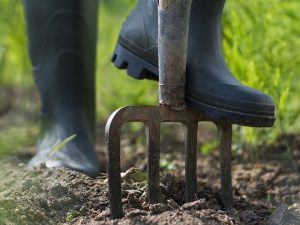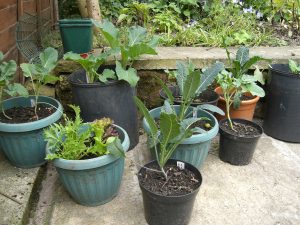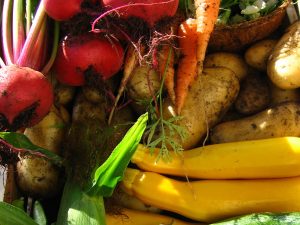Thought not having a garden meant there was little point in composting? Think again! Having covered the basics of composting in Part 1 of the series, Ethical.net take a look at different ways of composting indoors.
We’ll begin by looking at methods for composting indoors, in your kitchen or elsewhere in the home. These methods do not require a garden, or even a lot of space. One or two people can easily compost within a single cupboard – perhaps under the kitchen sink. Even larger families living in small homes can find space for a composting system able to deal with all of their compostable waste.
However, indoors composting may still be useful for those with gardens or outdoor space; composting food waste before putting it outdoors can prevent any potential problems with attracting rodents or other pests to your outdoors composting system.
Small-scale food waste composting
The simplest way to start composting is to place cardboard, fruit and vegetable scraps, and other compostable materials from your home into a small lidded bucket or other container. Actually, it is best to have two containers, so that one can be left to break down once full, with further waste put into the second in the meantime.
Ideally the container should not be airtight: if the composting turns anaerobic, it can start to really stink. Another consideration is choosing a receptacle that can have a tap fitted near the bottom, allowing excess liquid to be easily drained.
As a bonus, this fluid can be diluted with three parts water to make a nutrient-rich liquid feed for your plants.
Vermiculture
A composting container can also lend itself to vermiculture (vermicomposting): using specific worms to help create particularly fertile compost, rich in worm castings. This method can speed up the composting process, and is a great solution for small spaces.
Worms require a habitat (existing compost, cardboard, paper) and food (vegetative scraps). They will also need oxygen, and sufficient water (but not too much).
Worms and wormeries are available to buy online. Alternatively, you can make your own wormery quickly and relatively easily with a few basic DIY skills. The worms you want are not regular earthworms but rather ‘red wrigglers’ or ‘tiger worms’; specialist compost helpers. As with a regular composting container, a wormery should ideally have a tap near the base to allow excess water to be easily drained.
Both of the methods described above can work well – but only for certain materials. We have briefly touched upon the things that you could compost, but here are some of the things that should be kept out of your compost heap:
- Meat and fish
- Citrus peel, onion, and garlic (at least not too much, and none if you are using worms, as the acidity can be harmful). Instead, use onion skins to make stock, and consider using citrus peel to make household cleaners.
- Dog or cat faeces (non-meat-eating pet faeces is fine in regular composting)
- Hidden plastic (such as often found in tea bags, for example)
Bokashi buckets
Some things not suitable for traditional composting or a wormery, like meat and fish, could be composted using the bokashi fermentation method. Dairy products may also be better dealt with in this way, too.
Placing layers of special bokashi bran and food scraps into a bokashi bucket can accelerate the speed at which they break down into a valuable fertiliser. A simple five-gallon bucket is perfect for making your own bokashi. Add a tap to drain off the bokashi tea near the base of the bucket, and consider a second bucket so you can always have one to add to.
Speeding up the process when composting indoors
While using worms, or the bokashi method, consider also using a compost tumbler to further accelerate the process. This drum-shaped container turns to keep the waste inside well-mixed and aerated.
What to do with the compost if you don’t have a garden
Those without gardens often ask what to do with compost once they have made it. The answer is simple: use your home-made compost to grow food inside your home. Even in the smallest spaces, it is possible to get imaginative and find space to grow at least a little of your own food.
Fill your pots and containers with the compost you create, and top them up to maintain fertility over time. Also consider making a compost liquid plant feed for indoor (or outdoor) plants:
- Fill one-third of a container (which has a lid) with home-made compost
- Fill the rest of the container with water (ideally rainwater, if you have access to it)
- Stir the mixture thoroughly
- Put the lid on the container and leave it to stand for a week or two
- Strain the liquid through a sieve or a piece of old fabric
- Water your house plants (or plants in your garden if you have one) with this liquid right away, or at least within a day or two, so the nutrients are not lost
A large family will obviously produce more compost than a lone individual. If you do have more compost than you can use, you may be able to take advantage of a compost collection scheme in your area. But even where there is a system in place, you could also consider collaborating with friends or neighbours; if you do not need the compost you make, perhaps your neighbours will.
If you run out of space to grow food in your home, perhaps you could become involved in setting up a community garden in your area. One may even already exist. Alternatively, you may be able to talk to your local authority about the availability of allotments.
Stay tuned for the next installment covering outdoor composting methods coming soon.
Shared and adapted from an original article by Elizabeth Waddington here on the Ethical.net blog. Main image: Patricia Valério via Unsplash.
Ethical.net is a collaborative platform for discovering and sharing ethical alternatives, whether purchasing from a social enterprise, thrift shopping, or learning how to fix your old phone instead of buying a new one. They aim to make ethical the new normal.










4 Comments
composting is said by some to be the most important thing we’ll ever do. Making it possible on a small scale, for those who don’t yet have an allotment or bigger plot, is a massively encouraging way to enable many more people to do a positive thing about the climate crisis, as well as having fun growing their parsley, chives, tomatoes…
Just pointing out that in small-scale composting the scraps of paper/card and the veg scraps need to be chopped VERY small. The smaller the pieces, the quicker the compost. If this is not done, it will take so long for the compost to form that a large number of buckets will be needed in the rotation!
I housesit. I am depressed at the numbers of houses I visit that have no intention of composting (too inconvenient, too messy, too blah blah..) or even have the faintest notion about reduce, recycle, repurpose, repeat earth-saving concepts. Do you think that there are too many manufacturers producing too much ‘stuff’ for too many sleepers/comatose doing too little to avoid the climate change ‘tipping point’?
homeminderuk – I know. If I’m in someone else’s house and ask where to put a tea bag, banana peel, apple core etc, and they say in the normal bin with unrecylable rubbish, I often ask take it home to compost it – it just hurts to put organic waste in the bin.